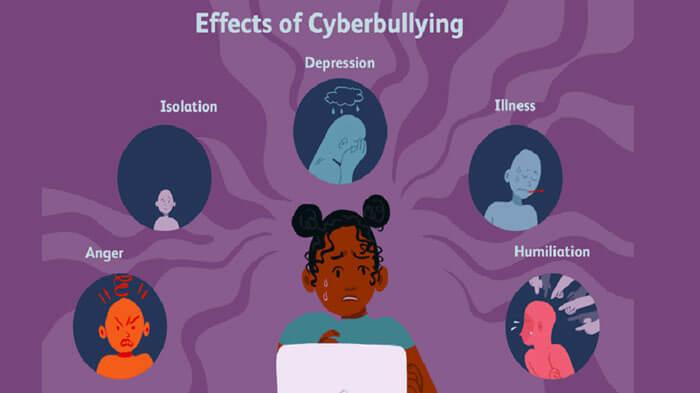The Psychological Effects of Cyberbullying

Cyberbullying is the use of electronic communication to harass someone, usually by sending intimidating or threatening messages.
While cyberbullying can occur in an open digital environment, such as a social media post, it can also occur in the form of private messaging, leaving some people, especially children to manage this secret and its impact on them on their own.
15% to 35% of young people have experienced cyberbullying, according to a 2020 study which also states that adults may also be affected by cyberbullying.
A significant 2021 study found that adult men in particular may be more likely to experience cyberbullying if they have mental health issues like depression, anxiety, and substance use.
Spreading false information about someone, revealing private information that could be embarrassing or shameful, sending sexual photographs or messages without the victim’s knowledge, or using inappropriate language to refer to someone are all examples of cyberbullying. It can happen in places like text messages, online forums, social media, gaming networks, chat rooms, and other digital areas.
When someone deliberately tries to hurt another person with escalating anger by using electronic devices to convey cruel and hateful words, such activities may spread swiftly online and “go viral,” adding to the psychological stress already experienced by the victim of the bullying.

According to 2020 research, persons who are targets of cyberbullies may suffer physical and mental harm. However, many victims of cyberbullying may choose to remain silent out of embarrassment, fear, or humiliation.
Both adults and children who experience cyberbullying run the risk of developing depression, anxiety, loneliness, suicidal thoughts, low self-esteem, social isolation, substance abuse or unhappiness.
Given that many teenagers and even younger children spend countless hours online through their phones, laptops, or other digital devices, today’s youth are especially vulnerable.
Although some children may not exhibit any signs of cyberbullying, experts encourage parents to keep an eye out for substantial changes in their child’s routines or behavior.
For instance, monitoring social media more often than normal could indicate a problem. Parents must keep the channels of communication open by asking their child about cyberbullying and whether they have ever been a victim of it.

Changes in a child’s behavior, such as trouble sleeping, nightmares, skipping school, feeling helpless, losing self-esteem, stomachaches or headaches, may be signs of cyberbullying.
Adults may also experience emotional symptoms like frustration, shame, and anxiety.
Parents can help children avoid or prevent cyberbullying by discussing with them the importance of being cautious while posting images or sensitive information online, especially content that they would not share with their parents.
Children can also prevent cyberbullying
by reporting cyberbullying to parents or another responsible adult, accepting online friend or network requests only from people they know, and thinking twice before “sexting,” which involves sending messages or images with explicit content.

If the effects of cyberbullying are affecting you, think about the following coping mechanisms; block cyberbullies or anyone acting dubiously from your online accounts, refrain from responding to or retaliating against cyberbullies directly because that may be the reaction they seek or unplug from social media, which is taking a break from it, which can help you gain perspective and reduce anxiety.
Author-Abednego Abaidoo




